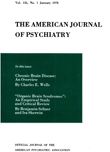Antagonistic Effects of Physostigmine and Methylphenidate in Man
Abstract
The authors describe the antagonistic effects of physostigmine, a centrally acting acetylcholinesterase inhibitor, and methylphenidate, an amphetamine-like stimulant, on manic and schizophrenic patients. In both patient groups, physostigmine increased behavioral inhibition and decreased behavioral activation; patients displayed symptoms that are characteristic of psychomotor inhibition. Methylphenidate had the opposite effect of increasing activation and decreasing inhibition. Treatment with each drug antagonized the effects of the other. In the schizophrenic patients, physostigmine prevented and reversed the meththylphenidate-induced symptoms of psychosis. In manic patients, physostigmine decreased and methylphenidate increased manic symptoms.
Access content
To read the fulltext, please use one of the options below to sign in or purchase access.- Personal login
- Institutional Login
- Sign in via OpenAthens
- Register for access
-
Please login/register if you wish to pair your device and check access availability.
Not a subscriber?
PsychiatryOnline subscription options offer access to the DSM-5 library, books, journals, CME, and patient resources. This all-in-one virtual library provides psychiatrists and mental health professionals with key resources for diagnosis, treatment, research, and professional development.
Need more help? PsychiatryOnline Customer Service may be reached by emailing [email protected] or by calling 800-368-5777 (in the U.S.) or 703-907-7322 (outside the U.S.).



